
Books
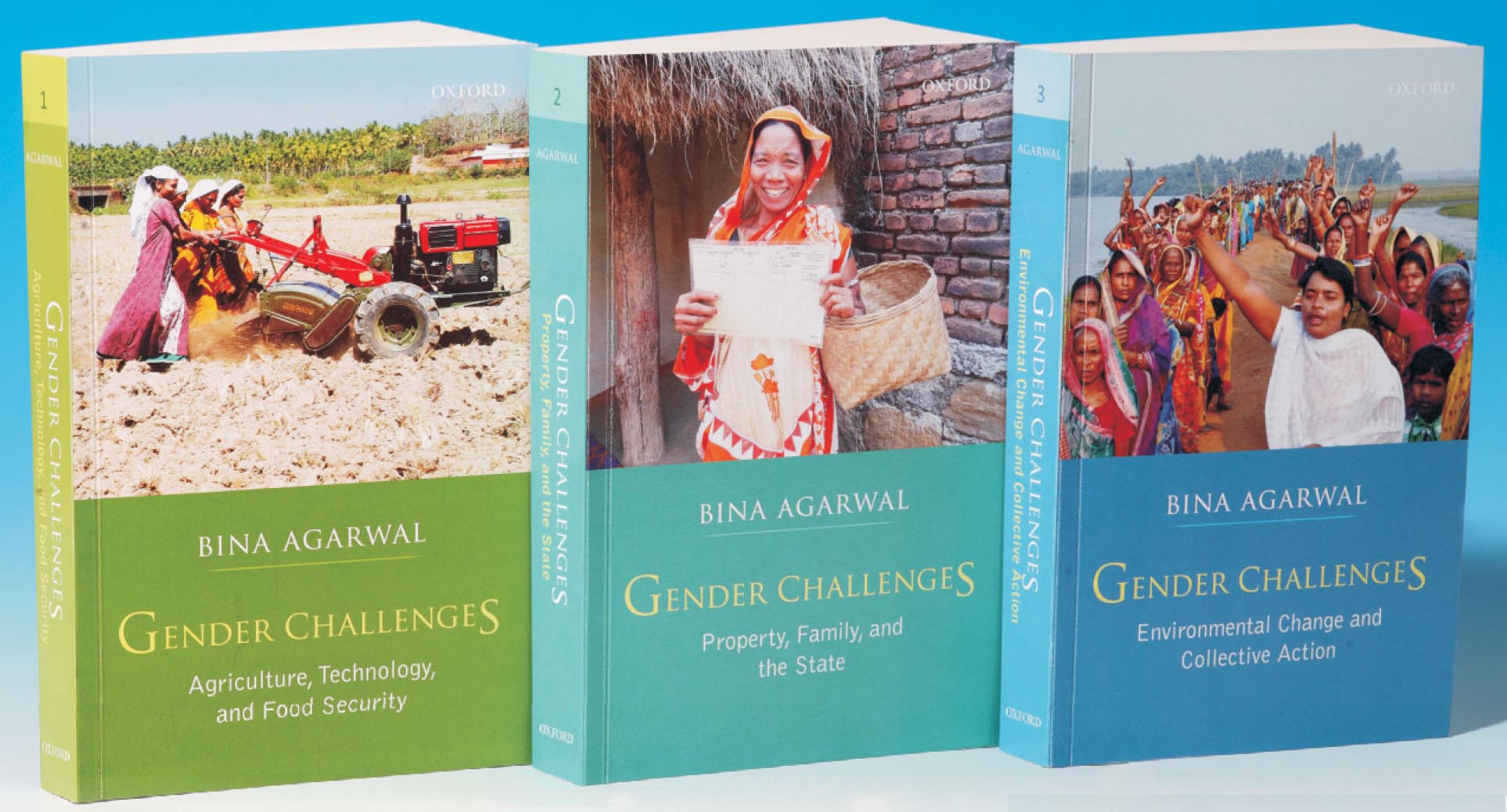
![]() “GENDER
CHALLENGES” A three volume compendium of selected papers (Oxford
University Press, India: 2016)
“GENDER
CHALLENGES” A three volume compendium of selected papers (Oxford
University Press, India: 2016)
Author: Bina Agarwal
Flyer,Launch
Pics,
Launch Videos
, News Coverage, Interviews,
Reviews
This three-volume compendium brings together a selection of the author’s
path-breaking essays on agriculture, property rights, and the environment,
written over the last three decades. Combining diverse disciplines, methodologies
and cross-country comparisons, the essays both challenge and illuminate
standard economic assumptions from a gender perspective. The essays provide
original insights on a wide range of theoretical, empirical, and policy
issues of continuing importance in contemporary debates.
Volume 1 spans the author's writings on agrarian change
since 1981. It identifies gender inequalities in the impact of technical
change in agriculture in Asia and Africa; the links between women, poverty,
and economic growth processes; the statistical undercounting of women's
work; and the key role of women farmers in food security. It also offers
innovative institutional solutions as ways forward.
Volume 2 focuses on the author's paradigm-shifting work
on women's property status in South Asia. It demonstrates the key importance
of promoting access to property, especially land, for women's economic
empowerment; details gender inequalities in inheritance laws, public policies,
and land struggles; and presents the bargaining framework for understanding
and overcoming these inequalities.
Volume 3 traces the relationship between gender and environmental
change. Critiquing ecofeminism, it outlines an alternative theoretical
framework. Also, based on the author's fieldwork on community forest governance,
it demonstrates how a critical mass of women can significantly improve
conservation. Finally, the author reflects on which features of feminist
scholarship make for an effective challenge to mainstream economics.
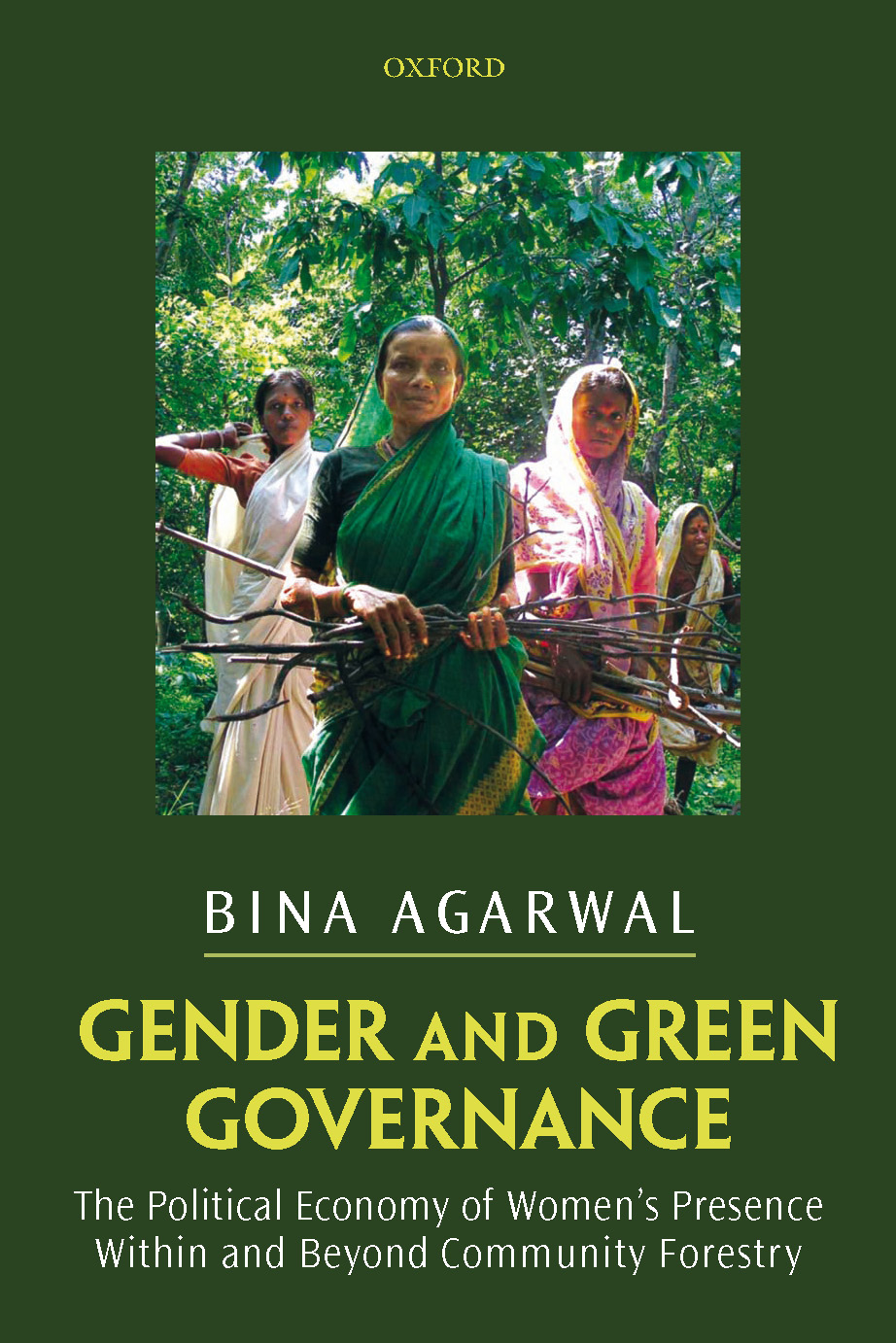
![]() GENDER AND GREEN
GOVERNANCE (Oxford University Press, Oxford.)
GENDER AND GREEN
GOVERNANCE (Oxford University Press, Oxford.)
Author: Bina Agarwal
Flyer, UK Paperback Flyer,
UK Hardback Flyer, India
Hardback Book Release Function Pics
Reviews
Economists studying environmental collective action and green governance
have paid little attention to gender. Research on gender and green governance
in other disciplines has focused mainly on women's near absence from forestry
institutions. This interdisciplinary book turns that focus on its head
to ask: what if women were present in these institutions? What difference
would that make?
Would women's inclusion in forest governance — undeniably important for
equity — also affect decisions on forest use and outcomes for conservation
and subsistence? Are women's interests in forests different from men's?
Would women's presence lead to better forests and more equitable access?
Does it matter which class of women governs? And how large a presence
of women would make an impact? Answers to these questions can prove foundational
for effective environmental governance. Yet they have hardly been empirically
investigated. In an analysis that is conceptually new and statistically
rigorous, using the author's primary data from India and Nepal on community
forestry institutions, this book is the first major study to comprehensively
address these wide-ranging issues
 PSYCHOLOGY, RATIONALITY AND ECONOMIC BEHAVIOUR: CHALLENGING STANDARD
ASSUMPTIONS (Palgrave: London, 2005)
PSYCHOLOGY, RATIONALITY AND ECONOMIC BEHAVIOUR: CHALLENGING STANDARD
ASSUMPTIONS (Palgrave: London, 2005)
Editors: Bina Agarwal and Alessandro Vercelli
Flyer for Psychology... Chapter
1 for Psychology
Economics has paid rather little attention to the psychological aspects
of economic behaviour, leading to somewhat simplistic assumptions about
human nature. The psychological aspects have typically been reduced to
assumptions of standard utility theory based on a very narrow conception
of rationality, often called “substantive rationality”. However,
recent work, some theoretic, some based on experimental economics or empirical
analysis of existing data, challenges these assumptions. It demonstrates
that we cannot understand the behaviour of economic agents without focusing
on the psychological determinants of their decisions, especially in an
increasingly complex and knowledge-based economy. This also requires a
less restrictive concept of rationality. The essays in this volume provide
a glimpse of this challenging and newly emerging field.
 CAPABILITIES,
FREEDOM AND EQUALITY: AMARTYA SEN’S WORK FROM A GENDER PERSPECTIVE
(Delhi: Oxford University Press, 2006).
CAPABILITIES,
FREEDOM AND EQUALITY: AMARTYA SEN’S WORK FROM A GENDER PERSPECTIVE
(Delhi: Oxford University Press, 2006).
Also published (without Sen’s original writings) under the title
Amartya Sen’s Work and Ideas: A Gender perspective (London:
Routledge), 2005. Flyer
for Amartya Sen’s Work and Ideas Bina
Agarwal introducing the book
Editors: Bina Agarwal, Jane Humphries and Ingrid Robeyns
This
volume is the first to examine Nobel Laureate Amartya Sen’s ideas
through the lens of gender. Renowned for his humanitarian approach to
economics, Sen’s contributions have been crucial to the development
of several aspects of feminist economics and gender analysis. The book
is meant both as a tribute to Sen and as a contribution to scholarship
and future research on gender. It both builds on Sen’s ideas and
engages with them critically. It outlines the range and usefulness of
his work for gender analysis while also exploring some of its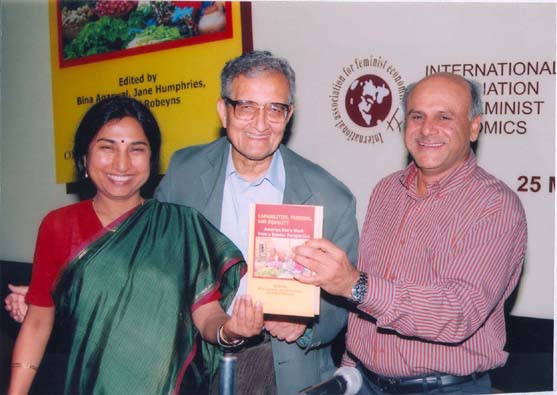 silences and implicit assumptions.
silences and implicit assumptions.
The essays cover major topics in Sen's work, such as the capability approach, freedom, social choice, justice, agency, “missing women”, and development and well-being. Perspectives are drawn from both developing and developed countries, with most of the authors applying Sen's concepts to cultural, geographic and historical contexts which differ from his original applications.
Significant
highlights include a wide-ranging conversation between the book's editors
and Sen on many aspects of his work, and an essay by Sen himself on why
he is disinclined to provide a definitive list of capabilities. The volume
also contains some of Sen’s original writings, as ready references
to be read in conjunction with the contributed essays.
 A
FIELD OF ONE’S OWN: GENDER AND LAND RIGHTS IN SOUTH ASIA (Cambridge:
Cambridge University Press (CUP), 1994. CUP South Asian edition, 1995.
Reprinted 1996, 1998).
A
FIELD OF ONE’S OWN: GENDER AND LAND RIGHTS IN SOUTH ASIA (Cambridge:
Cambridge University Press (CUP), 1994. CUP South Asian edition, 1995.
Reprinted 1996, 1998).
Author:
Bina Agarwal
"Awards, comments etc"
Economic analysis and policies concerning women have long been preoccupied with employment. This book argues that the single most important economic factor affecting women's situation is the gender gap in command over property.
Women's direct ownership and control of land can be crucial for enhancing their well-being, their bargaining power within and outside the household, and their overall empowerment. And it can have wide-ranging implications for poverty alleviation and production efficiency. In particular, the book outlines the effects of a lack of control over land and property on the lives and livelihoods of women across South Asia. It examines the property rights women enjoyed historically, traces changes over time, and their rights under contemporary law. It analyses the factors underlying a gap between law and practice and between nominal ownership and effective control. It examines forms of women’s covert and overt resistance. And it spells out alternative scenarios and policy options that could facilitate women gaining effective rights in land and other property.
Covering five countries - India, Pakistan, Bangladesh, Nepal, and Sri Lanka - in a bold sweep of comparative, interdisciplinary scholarship, the book brings to the analysis originality, rigour and complex historical, legal, socio-economic, and cultural perspectives. It draws on economic, ethnographic, historical, political, and legal sources; the author's fieldwork in north and northeast India; and extensive field visits and interviews in all five countries. The theoretical and analytical issues addressed here have relevance much beyond South Asia.
Widely used
by academics, activists and policy makers globally, and variously described
by reviewers as “a tour-de-force of inter-disciplinarity (The Economic
Journal), “a brilliant and exhaustive work” (The Sociological
Bulletin), and “the product of great erudition” (Health Transition
Review), the book has won several international and national awards. LINKS
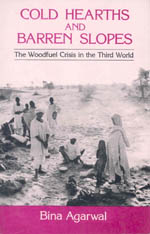 COLD
HEARTHS AND BARREN SLOPES: THE WOODFUEL CRISIS IN THE THIRD WORLD
COLD
HEARTHS AND BARREN SLOPES: THE WOODFUEL CRISIS IN THE THIRD WORLD
(London: Zed Books; Delhi: Allied Publishers; Maryland: Riverdale Publishers,
1986. Repr 1988).
Author: Bina Agarwal
With depleting forests and rapidly shrinking supplies of firewood and charcoal, a vast section of the Third World population, still dependent primarily on such woodfuels for its domestic needs, faced a severe crisis by the 1980s. Drawing upon evidence from Asia, Africa and Latin America, this book analyzes the scale of this other energy crisis, its complex causes, and its consequences, both at the individual level for the millions who rely on woodfuels, and overall for the ecological and agricultural systems of these countries. The solutions being offered for its alleviation are also critically examined.
The author
finds that most attempts by governments and international agencies to
promote afforestation and improved wood-burning stoves as solutions had
little success. In particular, few reached or benefited the rural poor
who were the principal sufferers of woodfuel shortages. Why did these
efforts fail? The book provides several pointers. Within the wider political
economy context, it questions whether truly effective solutions to the
crisis are possible without measures to reduce existing socio-economic
(especially land-based) inequalities; and without economic policies oriented
to a more energy-efficient and ecologically sustainable form of development.
The book also contributes to the debate on factors affecting the diffusion
of rural innovations.
 MECHANISATION
IN INDIAN AGRICULTURE
MECHANISATION
IN INDIAN AGRICULTURE
(Delhi: Allied Publishers, 1983; reprinted 1986).
Author: Bina Agarwal
Located within the debate on choice of technique in agriculture, this book, based on careful empirical analysis, examines the possible ways by which the mechanization of agriculture in a labor surplus economy such as India, can lead to a conflict between the twin objectives of higher output and higher employment.
Agricultural
mechanization, it is argued here, is essentially a mixed package. Since
different farm operations and crops lend themselves to different degrees
and forms of mechanization, the implications are likely to vary by technique,
operation and crop. Unlike most existing studies which confined themselves
to the impact, principally of tractors, on total farm output and employment,
this study, through a detailed statistical analysis of cost of production
data, disaggregates the output and employment implications of tractors,
tubewells and threshers by crop and operation, and by the ownership and
hire of equipment, for different farm size groups. The employment effect
is further separated by family, permanent and casual labor; and a new
index of cropping intensity, based on the time duration of crops, is specified.
The book's disaggregative and innovative approach and rigorous empirical
analysis is a significant point of departure from previous studies and
leads to quite different policy conclusions.
 STRUCTURES
OF PATRIARCHY: STATE, COMMUNITY AND HOUSEHOLD IN MODERNISING ASIA
STRUCTURES
OF PATRIARCHY: STATE, COMMUNITY AND HOUSEHOLD IN MODERNISING ASIA
(London: Zed Books; Delhi: Kali for Women, 1988; reprinted in paperback
1990).
Editor: Bina Agarwal
Is State-directed
development gender-neutral? The essays in this volume indicate otherwise.
They trace the complex and often interlinked ways in which the state,
the community and the household both structure and are structured by male
bias. Mostly focused on contemporary developments, the volume examines
the gender impact of agricultural growth strategies in Sri Lanka, Malaysia,
India and China; export-oriented industrialization in Southeast Asia;
the new population policies in Malaysia and Singapore; and the rise of
religious fundamentalism in Iran and elsewhere. These diverse themes are
analytically woven together in the book's detailed introduction that also
provides a comparative international perspective. It shows how the state,
the community and the household can be seen as interacting structures
embodying pulls and pressures which may, at specific junctures and in
different country contexts, converge or move in contradictory directions,
in the latter case providing spaces for building countervailing resistance.
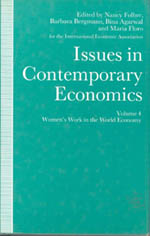 WOMEN
AND WORK IN THE WORLD ECONOMY
WOMEN
AND WORK IN THE WORLD ECONOMY
(London: Macmillan Press, 1991).
Editors: Nancy Folbre, Barbara Bergmann, Bina Agarwal and Maria Floro
The essays
in this volume (selected from papers presented at the International Economic
Association Congress in Athens, 1989) examine the nature of gender bias
in public policies and its effect on women's work in the labor market
and at home, in both developing and developed countries. The topics explored
include the feminization of poverty, tax disincentives and women's labor
force participation, and the penalties of part-time work, in a diverse
range of countries such as Pakistan, Japan, East Germany and the United
States.
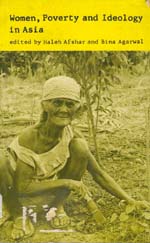 WOMEN,
POVERTY AND IDEOLOGY IN ASIA: CONTRADICTORY PRESSURES, UNEASY RESOLUTIONS
WOMEN,
POVERTY AND IDEOLOGY IN ASIA: CONTRADICTORY PRESSURES, UNEASY RESOLUTIONS
(London: Macmillan Press, 1989).
Editors: Haleh Afshar and Bina Agarwal
Poverty makes it necessary for all household members to engage in income-generating work. But prevailing ideologies and social norms may demand a rigid gender division of labor, emphasize motherhood and domesticity for women, and confine them to specific activities within circumscribed spaces. Poor women can thus be faced with conflicting choices between survival needs and social status within the community.
Based on
experiences from South and Southeast Asia, this book examines such possible
contradictions between the economic interests of women in poor Asian households
and prevailing gender ideologies and associated cultural practices. As
the case studies show, women experience this conflict in greater degree
in South Asian countries than in those of Southeast Asia, and resolve
the conflict in different ways.